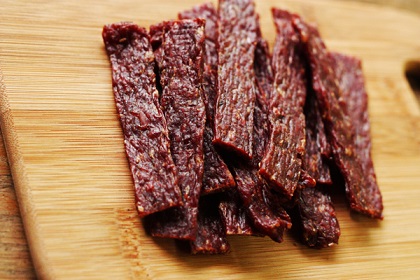Beef jerky is something you can enjoy anywhere, be it in front of the TV watching your favorite movie, at the ballgame, or while camping, fishing, or hunting. Beef jerky is popular, but it is definitely no modern marvel, as humans have been drying lean meat for thousands of years. They have been doing it for lean meat, including pork, beef, smoked turkey, and venison to preserve it. You may have heard that beef jerky is a high-energy snack, but the question is it healthyfor everyone? Should you include it in your diet? Let's find out more about it.
Is Beef Jerky Healthy?
Yes, it is. The reason is that it provides you with loads of protein. Every ounce of beef jerky provides you with 9.41g of protein along with essential minerals and vitamins. The only thing to check is how much sodium and fat are there in it, which is the reason why it makes sense to check the nutrition label before making it a part of your diet.

Here is more about nutrition breakdown of beef jerky to help you find an answer to your question, "Is beef jerky healthy?"
1. Calories and Macro-Nutrients
Dried beef or lean beef jerky has loads of protein and very few fat and calories. You will get about 13g of protein from a 28g serving of beef jerky. The same serving size provides you with less than 2g of fat and about 80 calories in total. It contains less than 1g of saturated fat. You also get about 5g of carbs from a serving of beef jerky. What you should bear in mind is that beef sticks are high in fat, calories, and saturated fat, better avoid or limit your intake.
2. Iron
If you are looking for food that would help improve your iron intake, you should include beef jerky in your diet. A 28g serving of beef jerky provides you with about 1.8mg of iron, which equals to 10% of your recommended daily intake. You have to pay attention to your iron intake to stay healthy because its deficiency can lead to anemia. Beef jerky is a great choice to get more iron, especially considering the fact that the iron in it is in heme form that your body can absorb easily.
3. Vitamin B 12
Is beef jerky healthy? Yes, the presence of vitamin B12 can benefit you greatly. Your body needs this vitamin to maintain healthy red blood cells. Most fortified cereals as well as animal products are rich sources of vitamin B12, and you get about 1 mg of vitamin B12 from a 100g serving of beef jerky. This equals 15% of your daily requirement of vitamin B12.
4. Protein
One simple reason to include beef jerky in your diet is to take advantage of its protein content. It provides you with high quality complete protein along with all amino acids. You can always have it between meals to keep full and rely on it for faster muscle recovery after workouts. An ounce of beef jerky provides you with anywhere between 9 and 14g of protein, – depending on the quality and brand of jerky you buy. Still, it helps you meet your daily requirement of protein – men need about 56g of protein a day and women require about 46g of protein per day.
5. Zinc
It is important to pay attention to your intake of zinc because it supports many of your body functions, including the process of cell division and your immune system. An ounce of beef jerky provides you with 2.3mg of zinc, which is enough to meet 17% of your daily requirement of zinc – you need at least 40mg of zinc to stay healthy. Not getting enough zinc everyday may lead to its deficiency that results in loss of the smell and taste senses and slow wound healing.
Warning: Control Your Portion
Is beef jerky healthy? Yes, it is. It provides you with zinc, protein, iron, vitamin B12, and many macro-nutrients without loading you up with too many calories. However, it is still a good idea to limit your intake of beef jerky, especially if you are on a low-sodium diet. Beef jerky contains salt, which is used as a preservative in this case. You get about 626mg of sodium out of a 28g serving of dried beef. It is important that you do not consume more than 2,300mg of sodium a day. You should keep it lower than 1,500mg if you are following a low-sodium diet. Not paying attention to your sodium intake may lead to hypertension and other cardiovascular issues.
Choose Wisely
Along with paying attention to portion control, you also need to take special care when selected beef jerky. You should opt for the one with the lowest level of saturated fat. Look for brands that manufacture thin strip versions of meat. They are low in fat and saturated fat. Similarly, you will be better off looking for low-sodium versions because they are more nutritious. A great idea is to make beef jerky at home to have full control over how much sodium to add. You can always use a food dehydrator to make beef jerky with ease.
